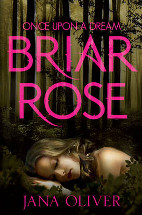Briar Rose by Jana Oliver

Macmillan, 2013. ISBN 9781447241096.
(Age: 15+) Imagine the Sleeping Beauty tale revisited upon a
small Southern town in America. Sounds intriguing? If only it
delivered as much as promised.
Growing up in the small township of Bliss, Briar Rose's life at
first seems aptly blissful, until we learn that a family feud has
come between Briar and her former best friend, Joshua Quinn. To make
matters worse, Briar discovers that due to an old curse, she will
not survive her 16th birthday, which just happens to be when the
novel starts.
However, instead of dying, Briar falls into a deep slumber inhabited
by a fairy tale nightmare. Instead of a charming tale of handsome
princes and fabulous castles, Briar awakens to a world filled with
violence and dread. In this nightmare world, while the beautiful
princess sleeps, the young princes who try to awaken her are
brutally killed and a cruel regent rules in place of the Royal
family.
In the first half of the novel, the fairy tale within a fairy tale
scenario is cleverly deployed and the main characters are credibly
complex. However, gradually our engagement with the story starts to
wane. This is partly due to the writer's narrative style which is
overtaxed with Americanisms. These become particularly distracting
as the action intensifies; the constant use of phrases like 'Right
back at you, girlfriend' simply sounds cheesy and dissipates the
supposed tension at critical moments. Whilst humour can be used to
balance darkness, these attempts at lightness feel corny rather than
clever.
The characters also become more one-dimensional as the novel
progresses: Briar's first saviour, Ruric, loses his mysterious
qualities and behaves like a stock storybook prince, whilst the bad
boy at the start of the novel (Pat Daniels) is all too easily
reformed! Meanwhile the budding romance between Briar and Joshua is
described in increasingly mawkish and unrealistic terms.
Ultimately, what begins as an enticing premise is diminished by the
manner of the telling.
Deborah Marshall